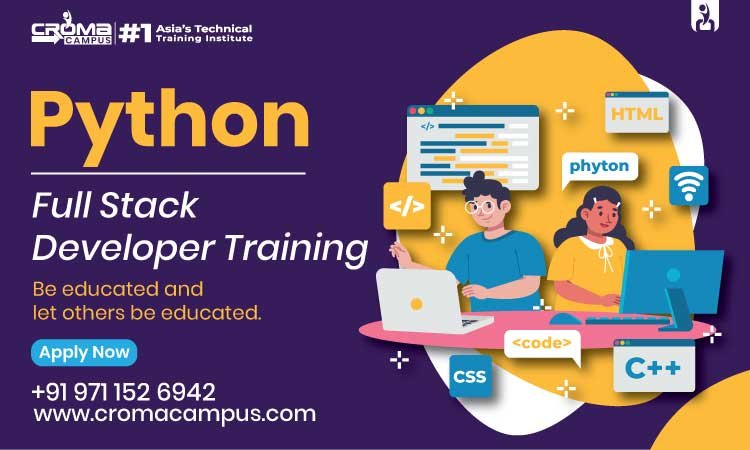
Introduction
In the dynamic realm of web development, the role of a Python Django Full Stack Developer has emerged as a pivotal force, bridging the gap between front-end and back-end technologies. Lately, numerous companies are also looking for skilled Django Developer, but unfortunately, the grant is quite low. So, if you wish to turn into a knowledgeable Python Full Stack Developer, you must get related with a legit educational provider first.
Let’s now have a look at the multifaceted world of a Python Django Full Stack Developer, exploring their role in the development process, the essential skills required for success, and the promising future that awaits those who embark on this technological journey.
The Role of a Python Django Full Stack Developer
A Python Django Full Stack Developer is a versatile professional responsible for both front-end and back-end development within a web application. This role requires a comprehensive understanding of the entire development process, from creating visually appealing user interfaces to implementing robust server-side logic. Let’s dissect the key components of their role:
- Front-end Development:
In the realm of front-end development, a Python Django Full Stack Developer works with technologies such as HTML, CSS, and JavaScript to create the visual elements of a website or web application. This involves designing user interfaces, ensuring responsive and user-friendly layouts, and implementing interactive features that enhance the overall user experience.
- Back-end Development with Django:
On the back end, Python Django serves as the powerhouse for a Full Stack Developer. Django is a high-level web framework that enables developers to build robust and scalable web applications efficiently. It follows the Model-View-Controller (MVC) architectural pattern, providing a structured and organized approach to development. Full Stack Developers leverage Django to handle server-side logic, manage databases, and ensure seamless communication between the front-end and back-end components of an application.
- Database Management:
Full Stack Developers are often tasked with database management, involving the design, implementation, and maintenance of databases that store and retrieve application data. Django integrates seamlessly with various databases, and a Full Stack Developer must be adept at database design, optimization, and management to ensure efficient data handling within the application.
- Version Control and Deployment:
Version control systems, such as Git, play a crucial role in collaborative development. Full Stack Developers are responsible for managing code repositories, tracking changes, and collaborating with other team members. Additionally, deploying applications to production environments requires an understanding of deployment tools and server configurations, skills that are integral to the Full Stack Developer’s toolkit.
Explore more about How 4x ^ 2 – 5x – 12 = 0 is solved through multiple methods and get updated.
Essential Skills for a Python Django Full Stack Developer
To excel in the role of a Python Django Full Stack Developer, a diverse skill set is essential. These skills span both front-end and back-end technologies, as well as soft skills that contribute to effective collaboration and problem-solving. Here are the key skills required:
- A strong foundation in Python is fundamental, as it is the primary language used in Django development. Full Stack Developers should be proficient in Django’s syntax, features, and best practices to build scalable and maintainable applications.
- Mastery of front-end technologies, including HTML, CSS, and JavaScript, is essential for creating visually appealing and responsive user interfaces. Familiarity with front-end frameworks such as React or Vue.js can enhance the developer’s ability to build dynamic and interactive web applications.
- The Model-View-Controller (MVC) architectural pattern is at the core of Django development. A Stack Developer must have a solid understanding of MVC principles to organize code efficiently, enhance maintainability, and separate concerns between the model, view, and controller components.
- Competency in database management is crucial, and Full Stack Developers often work with relational databases such as PostgreSQL or MySQL. Skills in designing schemas, optimizing queries, and ensuring data integrity are essential for effective back-end development.
- Proficiency in version control systems, particularly Git, is vital for collaborative development. Full Stack Developers use Git to track changes, manage branches, and coordinate with team members, facilitating a seamless and organized development process.
- Full Stack Developers frequently integrate third-party APIs (Application Programming Interfaces) into their applications to enhance functionality. Understanding how to work with APIs, whether for payment processing, authentication, or data retrieval, is a valuable skill in a Full Stack Developer’s toolkit.
- Effective communication, problem-solving, and teamwork are indispensable soft skills for a Full Stack Developer. Collaborating with cross-functional teams, translating client requirements into technical solutions, and adapting to evolving project needs are integral aspects of the role.
The Future of a Python Django Full-Stack Developer
Well, the role of Python Django Full Stack Developer is poised to play a pivotal and transformative role in shaping the digital landscape. Several trends and developments are expected to influence the trajectory of Full Stack Developers, making their expertise increasingly indispensable. Let’s explore the key aspects that define the future of a Python Django Full Stack Developer:
- The demand for Full Stack Developers is expected to continue its upward trajectory. Companies are increasingly recognizing the efficiency and agility that Full Stack Developers bring to the development process. As technology ecosystems become more integrated, the ability to seamlessly navigate both front-end and back-end development remains a highly sought-after skill set.
- The future of Full Stack Development lies in its role as a bridge between different functional areas within an organization. Full Stack Developers are well-positioned to collaborate with cross-functional teams, including UI/UX designers, data scientists, and business analysts. This collaborative approach ensures that development aligns with business goals and user experience requirements.
- The integration of AI and ML technologies into web applications is a trend that Full Stack Developers are likely to encounter more frequently. Python, being a versatile language, is at the forefront of AI and ML development. Full Stack Developers adept at integrating AI-driven features into web applications will be at a distinct advantage.
- The future of web development is leaning towards microservices architecture, where applications are built as a collection of loosely coupled services. Full Stack Developers, with their comprehensive understanding of both front-end and back-end technologies, are well-suited to design, implement, and maintain microservices-based applications, enabling scalability and flexibility.
- Serverless computing, where developers can focus on writing code without the need to manage server infrastructure, is gaining prominence. Full-stack developers embracing serverless frameworks can streamline development processes, reduce operational complexities, and enhance the scalability of applications.
- The future of web development is leaning towards Progressive Web Applications, which offer an app-like experience within a web browser. Full Stack Developers proficient in creating responsive, fast, and engaging PWAs using technologies like Django will be instrumental in delivering optimal user experiences.
Conclusion
Well, from the information listed above, it’s quite clear that in the competitive landscape of today’s job market, learning Python Django Full Stack Developer Course is not just about acquiring a skill; it’s about future-proofing your career. The platform’s ubiquity, versatility, and continuous innovation make Salesforce proficiency a strategic investment in your professional journey. As the digital transformation era continues to unfold, Salesforce stands as a beacon of opportunity, and those who embrace its capabilities position themselves for success in the evolving landscape of the fourth industrial revolution.


